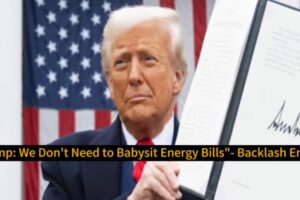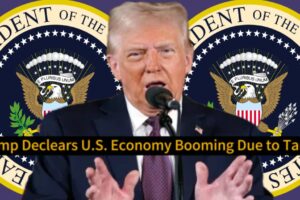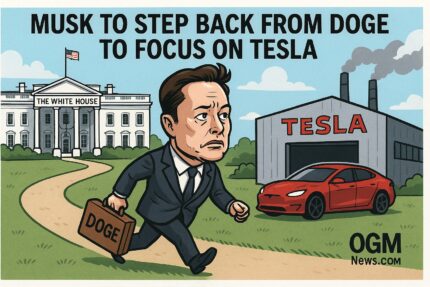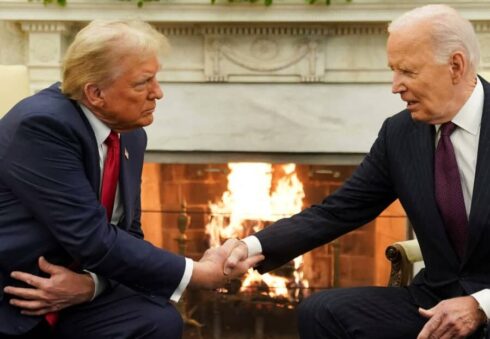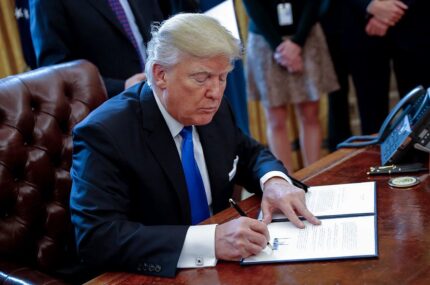Tesla’s Q1 2025 earnings report revealed a staggering 71% drop in net income, falling to $409 million, while total revenue declined by 9% year-over-year to $19.3 billion—far short of Wall Street’s forecast of $21.1 billion. Automotive revenue, the company’s core segment, shrank by 20%, pulling in just $13.9 billion. The electric vehicle giant also reported a dip in deliveries, down to 336,681 vehicles, compared to 386,810 in Q1 2024.
These results sent shockwaves through the investor community. Earnings per share came in at $0.27, missing the expected $0.39. Tesla’s operating margin also took a hit, exposing cracks in its efficiency amid pricing wars and slowing demand. Analysts noted that Tesla’s strategic decision to repeatedly cut vehicle prices may have stimulated volume but significantly eroded profitability.
Elon Musk Steps Back from DOGE as Political Pressure Mounts
Elon Musk announced he will step back from his role with the Department of Government Efficiency (DOGE), the federal initiative under the Trump administration, beginning May 2025. Musk cited that the “foundational work is largely complete” and said he may only be available one or two days per week for government duties, depending on presidential demand.
This move follows mounting criticism that Musk’s political activities have distracted from Tesla’s mission and damaged its public image. Once the poster child of clean innovation, Tesla has found itself mired in controversy over its CEO’s growing alignment with divisive political narratives. Elon Musk’s departure from daily DOGE operations is seen as a direct response to these concerns—and a bid to regain Tesla’s footing.
Public Backlash: From Tech Messiah to Political Pariah
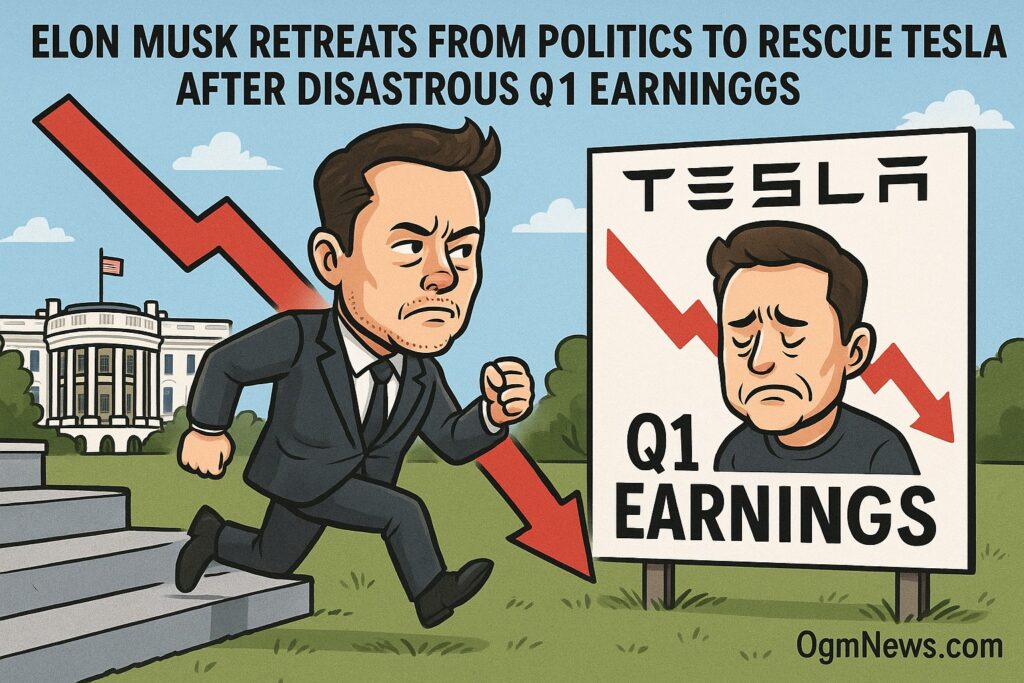
Musk’s government role has sparked intense backlash, particularly from Tesla’s core demographic of environmentally conscious, progressive buyers. Protests erupted at Tesla showrooms in cities like San Francisco, Seattle, and Berlin. Social media campaigns under hashtags like #BoycottTesla gained traction, while influencers and climate activists publicly distanced themselves from the brand.
More troubling, incidents of Tesla vehicle vandalism have been reported across North America and parts of Europe, suggesting growing hostility toward the company’s perceived political affiliations. Critics argue that Elon Musk’s entanglement with the federal government has muddied Tesla’s clean-energy image, leading to identity confusion and reputational damage in key markets.
Market Reactions: A Short-Term Bump Amid Long-Term Doubt
Following Elon Musk’s announcement to refocus on Tesla, shares jumped 5% in after-hours trading. However, the company’s stock remains down more than 40% year-to-date, reflecting deeper investor anxiety. Large institutional investors have begun pulling back their Tesla holdings, concerned over Musk’s unpredictable leadership and the growing intersection of politics and business.
Dan Ives of Wedbush Securities called Musk’s decision “a big step in the right direction,” but warned that regaining investor confidence will require more than soundbites. Many now question whether Tesla’s governance model—heavily reliant on Musk—can remain viable in today’s high-stakes environment. Some are calling for a stronger executive bench to share the operational load and stabilize day-to-day management.
Elon Musk’s Tesla Faces Rising Competition and Global EV Challenges
Tesla is no longer the undisputed EV king. In China, firms like BYD and Nio are rapidly eating into Tesla’s market share with competitive pricing and innovation. In Europe, Volkswagen, BMW, and Stellantis have launched their own electric models tailored for local markets. Meanwhile, U.S. players like Rivian and Lucid are nipping at Tesla’s heels in the premium and adventure-lifestyle segments.
Tesla’s price-cut strategy is no longer unique, and its edge in branding is weakening. Geopolitical tensions—especially between the U.S. and China—have further complicated Tesla’s Asian operations, while progressive buyers in liberal U.S. states are turning to alternatives they view as more aligned with their values. The competition is not only fierce—it’s ideological.
A New Chapter: Product Pivots and Strategic Refocusing
In a bid to rejuvenate its brand and realign with market expectations, Tesla announced two major initiatives: the launch of a lower-cost Model Y variant and the rollout of its driverless robotaxi service in Austin, Texas by June 2025. These projects are part of Musk’s broader plan to refocus on innovation and reestablish Tesla’s leadership in automotive technology.
“These are not distractions—they’re our core mission,” Elon Musk emphasized during the earnings call. While the announcements were generally well-received, analysts caution that execution will be key. Any further delays or safety issues—particularly with autonomous tech—could severely damage already fragile consumer trust and regulatory goodwill.
Financial Health: Strong Cash Reserves, But Storm Clouds Loom
Despite the earnings collapse, Tesla maintains a healthy balance sheet with $37 billion in cash and equivalents and $664 million in free cash flow. These buffers will provide some resilience as the company navigates short-term turbulence. However, analysts warn that persistent revenue declines could eventually strain even Tesla’s formidable liquidity.
Cost discipline, capital efficiency, and strategic clarity will be essential going forward. Tesla’s long-term bets on autonomy, robotics, and renewable energy remain enticing—but they now exist in a more crowded and skeptical marketplace. For now, Tesla must return to basics: rebuild its brand, stabilize its leadership, and reconnect with its once-loyal audience.
Tesla’s Q1 2025 earnings report marks more than a financial downturn—it signals a turning point. Elon Musk’s decision to step away from DOGE reflects growing pressure from investors, consumers, and critics to reassert Tesla’s mission and integrity. With stiff competition rising and political baggage weighing heavily, Tesla’s path forward depends not just on new products, but on restoring its once-clear vision. The world will be watching—closely.






